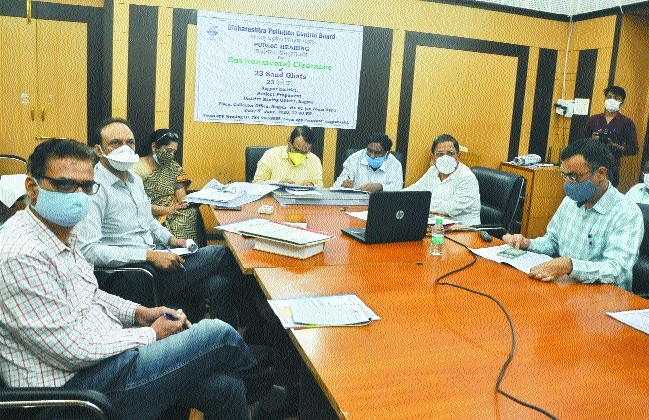Environmentalists raise objections during digital public hearing of sand ghats
| Date :09-Jun-2020 |

Ravindra Khajanji, Resident Deputy Collector; Hema Deshpande, Sub-Regional Officer of MPCB; M S Barhanpurkar, District Mining Officer, and others during the digital environmental public hearing regarding 23 sand ghats in Nagpur district, at Collectorate
on Monday. (Pic by Anil Futane)
Staff Reporter :
Despite opposition from environmentalists, Maharashtra Pollution Control Board (MPCB) went ahead with digital public hearing for environmental clearance to 23 sand ghats in Nagpur district, on Monday. However, during the digital hearing held at Collectorate, the environmentalists and participants who joined in via mobile phone application raised strong objections to such public hearing. Ravindra Khajanji, Resident Deputy Collector, chaired the public hearing.
Hema Deshpande, Sub-Regional Officer of MPCB; M S Barhanpurkar, District Mining Officer, and other officials from MPCB and Collectorate assisted the hearing panel. MPCB had organised digital public hearing on proposal of District Mining Officer, citing the reason that normal environmental public hearing could not be conducted due to COVID-19 pandemic situation. At the outset, Barhanpurkar and environmental consultant presented Environmental Management Plan through powerpoint slides. Many participants raised objection that complete information like public hearing notice, District Survey Report, Environmental Management Plan, Government order for conducting hearing via Zoom application was not available on website of MPCB or District Collector office. In absence of proper information, it was not possible to discuss technical issues, they said. The only document available was Executive Summary, which had no mention of rivers involved about sand mining, alleged some activists.
Sudhir Paliwal, Convener, Vidarbha Environmental Action Group (VEAG), urged the authorities to cancel the public hearings as due to COVID-19 pandemic it was not possible for the stakeholders and environmental groups to attend public hearing. He told ‘The Hitavada’ after the hearing that most of the ghats were on Pench and Kanhan rivers that were lifelines of Nagpur district. Extracting sand from these rivers will destroy fragile ecology of the region and may lead to large-scale poaching, he said. Also, he said, conducting public hearing on Zoom application was highly objectionable as such procedure was not laid down under EIA Notification 2006.
According to Paliwal, the participants were shocked to note that many of the ghats were overlapping the river water body, which is not permitted by Ministry of Environment and Forest and Climate Change and National Green Tribunal NGT irections. Most of Bina ghat was shown under Kanhan River water, he pointed out. According to him, Khajanji assured to look into the matter and report the same in the minutes of the hearing. Devendra Wankhede, Vidarbha Convener of Aam Aadmi Party, questioned validity of conducting public hearing during lockdown. Dr Swapnil Wanjari of VNIT emphasised that when several alternative materials like crushed stone sand, fly ash sand etc were available abundantly, there was no need for river sand mining that was harmful to environment.
Nitin Ronghe, Convener of Maha Vidarbha Janjagaran, objected to the proposed sand excavation map of Bina river, wherein half of the river bed was to be excavated for sand. Pratap Goswami demanded to postpone the hearing till the situation was normal, as no project affected person could participate in the digital hearing. Apart from other points, he alleged that vague figures of manpower required for sand mining were mentioned in the executive summary of the Environmental Management Plan. Noted architect Paramjit Ahuja objected to the river sand mining as it was damaging the river ecology, Paliwal told ‘The Hitavada’. Dr Sumer Bora also objected to river sand mining. Krishna Agrawal, who participated via Zoom application from Parseoni Tehsildar’s Office alleged that District Survey Report was incomplete and not as per guidelines. Later, Barhanpurkar read out the objections raised during the hearing and tried to justify sand mining by stating that if sand mining was not done floods would endanger the villages near the river banks. Regarding manpower required, he clarified that daily manpower required was mentioned in Environmental Management Plan.